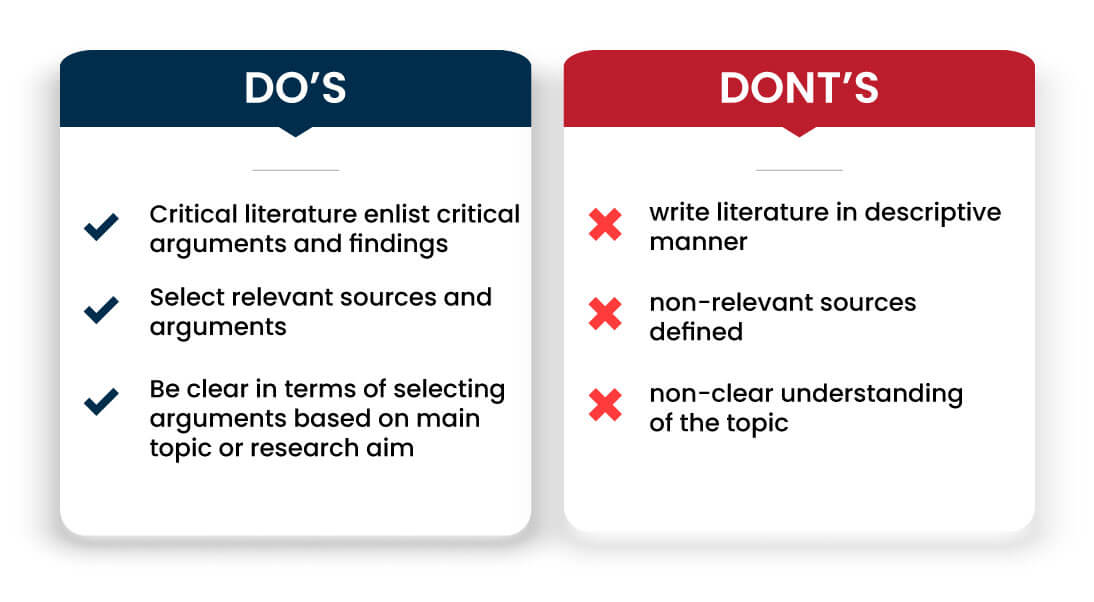Guide to Critical Literature Review
In general literature review is a basic overview that analyses and evaluates several sources on a specific topic. It is designed to give the user an overview of the research that has been done on the topic and to evaluate the sources examined. Concerning a critical review it is usually reviewing an article, statement or question or any type of book, you will not remember as much data point by point for each source. However, assuming the same conditions, you will be able to focus on the main point relevant to your topic. As with any basic review, you will assess whether the author’s arguments are relevant. You will then present areas where a lot of research has been done and areas where more research should be done. Contrast with the source, highlighting areas where the arguments are agreed and areas where they differ. Remember that you also need to find out and evaluate which of the author’s ideas seem most convincing and why. Then you finally, conclude what you have discovered and what the literature as a whole recommends on the topic. In doing so, try to reconsider your assessment of the overall validity of the claims stated by the other authors. In cans of having several aspects of the topic which might be researched in-depth, in that case, you will probably not be able to come to a positive conclusion. In this case, talk about why further validation is needed and how you are contributing to the research.
How to Write Critical Literature Review?
The structure of the critical review does not have any special rules. For example, you may first summarise and then evaluate, or combine these two perspectives, but your description must include the following parts.
-
Identify the Argument
You first identify yourself about the topic, as well as evaluate the books, and should have a basic idea about the book or article you are considering. Introduce the title and author of the book and briefly state the author’s arguments. Then set out your arguments for the validity of the book/article at this point. In doing so, you should clearly state the main reasons why you evaluate the article or book. Or in case your task requires you to review the book in regards to a wider issue, you should also mention in your review the important connections between the book and these different matters and arguments.
-
Select Relevant Empirical Sources
The sources which you choose to include in the review should be relevant to the main topic or research objective and research questions. This section should help you understand the author’s arguments. It clarifies the author’s position on the topic and explains the main concerns that support your statement or problem. It reflects the author’s decision on the relevant issues and provides the other views of the author’s on the problem or title.
-
Summarize the Empirical Sources
This part is the most important part of your review. Remember that you do not have to decide whether you agree with the author’s opinion, but how feasible the author’s argument is. To summarise the sources, you can proceed with the given steps.
- when summarizing the sources is important to identify whether the message is clear? Does the way the author expresses himself make his point of view clear? Or, on the contrary, does it create extra confusion or a sign of critique for others?
- Similarly, it is also needed to know whether the author’s arguments are stronger enough and the author’s main concerns adequately support the statement. And whether the claim was adequately substantiated? Is the claim coherent and coordinated?
- It is also essential to identify in summarising the content whether the author knows all sides of the issue and ensures whether the author has neglected important counterarguments?
- In general, which parts of the author’s statement do you find convincing? And less unconvincing?
In this way you can summarise the question and, if you think the author’s writing is contradicting, give reasons why they are contradicting the statement. You can create a guide to show the user your prominent points. In the unlikely event that you do not find the author’s arguments convincing, give reasons for your assessment.
-
Conclude Pertaining to the Topic
At the end of your review, repeat the key points of your evaluation (it is not necessary to reproduce the summary of the book or article). In the end, you can also give your overall assessment of the book or article. You can also give a final comment on the book, describing its contribution to the field or the possibilities for further research. The next objective is to assess the validity of the author’s arguments. Note down any questions or unclear points. Note down any issues that you think are important but are not mentioned by the author for special considerations.
What are the Differences between Systematic Review and Critical Review?
Systematic reviews
A systematic review consists of finding adequate answers to questions that are directed towards the research question. To achieve this objective, it is essential that the researcher conducting the systematic review should include and presents all the informative evidence that meets the eligibility criteria for this scientific research. Furthermore, systematic reviews are of particular importance in research areas where substantial work has been done and information has been produced in the past. Thus, in this context, the importance of a systematic review is to consolidate and characterise the research topic by thoroughly examining and evaluating the most recent experimental work on the topic.
Critical review
A critical review is a critical assessment of a proposed study which is reviewed by examining the various academic investigations currently underway on the topic. A critical review represents the analyst’s view of a particular study based on what the analyst knows with certainty and what the analyst further perceives through a critical examination of the data selected concerning the topic. Furthermore, critical review applies to research areas where point-by-point arguments on a particular research topic are needed to be identified to reach an accurate and precise conclusion on the research question. Thus, to facilitate findings, it is necessary to make an explicit and implicit assessment of the large number of accurate studies that have been conducted in regards to the research questions of the study.
Do’s and Don’ts

Checklist
- Critical literature should not be in descriptive aspect.
- Critical literature should use both types of arguments whether contradictory or supportive.
- The critical literature should conclude pertaining to the main topic.
Free Presentation Slides
About Jessica
Writing is my passion! Hi, I am Jessica, and for me, writing is an escape. I am a PhD expert in Marketing and have been sharing insights and info on mainly all subjective areas of marketing and business for the past 6.5 years. I started my career as a professor and worked with some well-known educational institutes in the UK. After working in the field of teaching for five years I decided to become a full-time writer and blogger. Now, I translate my years of experience in academics to help students know every detail of academic writing.




 Whatsapp
Whatsapp Contact
Contact Call
Call Live Chat
Live Chat